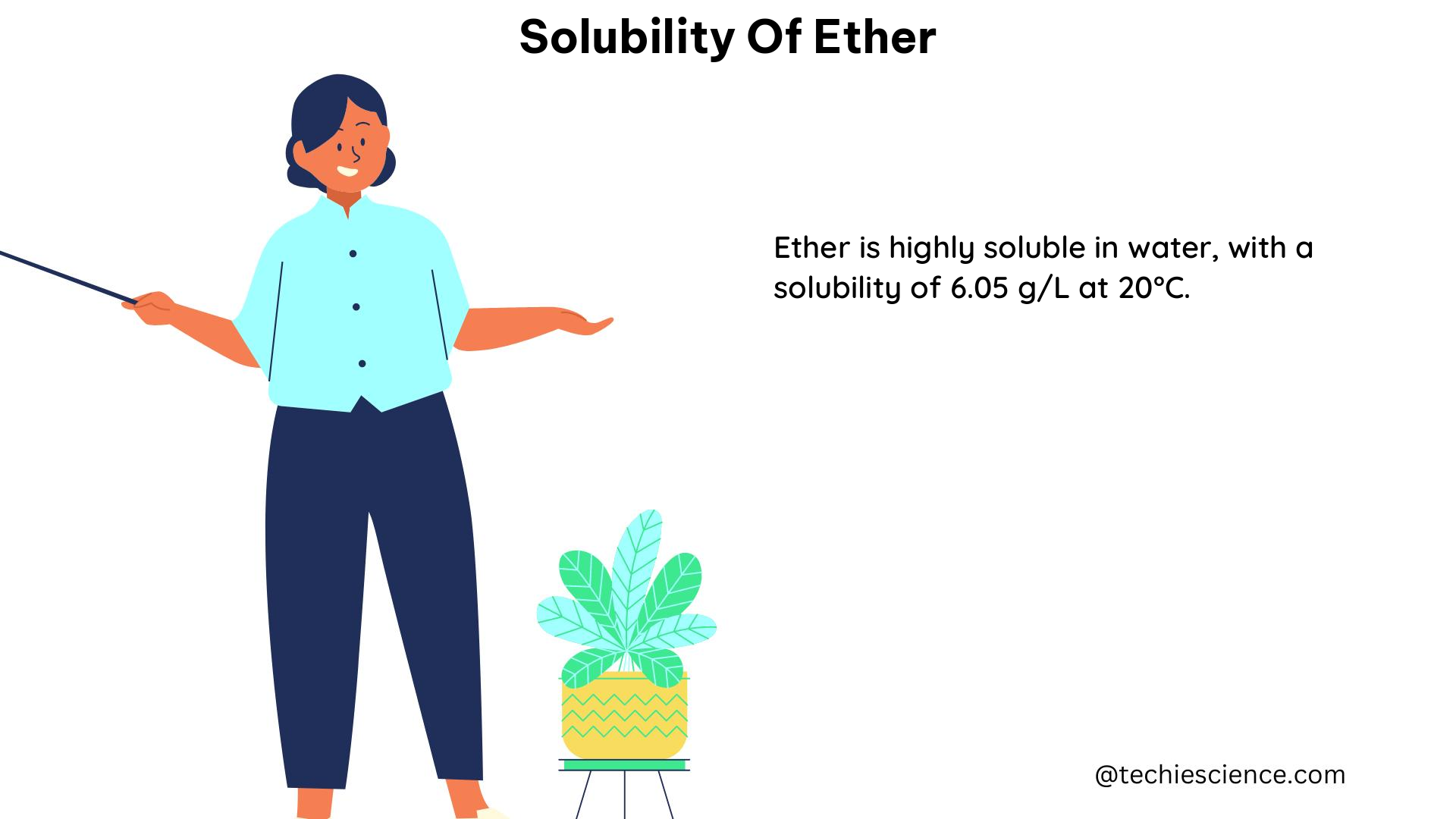The solubility of ether, a widely used organic compound, is a crucial property that determines its behavior and applications in various fields. Ether, with the general formula R-O-R’, where R and R’ can be alkyl or aryl groups, exhibits a unique solubility profile that is influenced by factors such as the number of carbon atoms, the presence of polar functional groups, and the nature of the solvent.
Understanding the Solubility of Ether in Water
Ether’s solubility in water is closely related to the solubility of its isomeric alcohols. For instance, dimethyl ether (CH3-O-CH3) and ethanol (CH3-CH2-OH), both with the molecular formula C2H6O, are completely soluble in water. In contrast, diethyl ether (CH3-CH2-O-CH2-CH3) and 1-butanol (CH3-CH2-CH2-CH2-OH), both with the formula C4H10O, are barely soluble in water, with a solubility of only 8 g/100 mL.
The solubility of ether in water is primarily determined by the ability to form hydrogen bonds with water molecules. Ethers containing up to 3 carbon atoms, such as dimethyl ether and diethyl ether, are soluble in water due to their ability to participate in hydrogen bonding. However, as the number of carbon atoms increases, the solubility in water decreases, as the non-polar alkyl groups become more dominant, reducing the overall polarity of the ether molecule.
Solubility of Ether in Organic Solvents

In addition to their solubility in water, ethers are also appreciably soluble in various organic solvents, such as alcohols, benzene, and acetone. This is due to the polarity of the C-O bond in the ether molecule, which allows for favorable interactions with the solvent molecules.
The solubility of ether in organic solvents can be quantified using the following equation:
Solubility = (Moles of ether / Moles of solvent) × 100%
For example, the solubility of diethyl ether in ethanol at 25°C is approximately 100%, indicating complete miscibility. Similarly, the solubility of diethyl ether in benzene at 25°C is around 80%.
Factors Affecting the Solubility of Ether
The solubility of ether can be influenced by several factors, including:
-
Number of Carbon Atoms: As mentioned earlier, the solubility of ether in water decreases as the number of carbon atoms increases. This is due to the increasing dominance of the non-polar alkyl groups, which reduces the overall polarity of the ether molecule.
-
Temperature: The solubility of ether in various solvents can be affected by temperature. Generally, the solubility of ether increases with increasing temperature, as the kinetic energy of the molecules increases, facilitating better mixing and dissolution.
-
Pressure: The solubility of ether can also be influenced by pressure. Increased pressure can enhance the solubility of ether in certain solvents, as it can lead to a more compact arrangement of the molecules and better intermolecular interactions.
-
Presence of Other Solutes: The presence of other solutes in the solvent can affect the solubility of ether. For example, the addition of salts or other polar compounds to the solvent can decrease the solubility of ether due to the “salting-out” effect, where the solute competes for the solvent molecules.
Boiling Points and Polarity of Ether
Ethers have a net dipole moment due to the polarity of the C-O bonds. However, this polarity is relatively weak compared to other polar functional groups, such as the hydroxyl group (-OH) in alcohols.
Interestingly, the boiling points of ethers are comparable to those of alkenes with similar molecular masses, despite the presence of the polar C-O bond. This is because the weak polarity of ethers does not significantly affect their intermolecular interactions, which are primarily governed by van der Waals forces.
In contrast, alcohols have much higher boiling points than their ether counterparts due to the presence of strong hydrogen bonding interactions between the hydroxyl groups. This difference in boiling points is a key distinguishing feature between ethers and alcohols.
Practical Applications of Ether Solubility
The solubility properties of ether have numerous practical applications in various fields, including:
-
Chemical Synthesis: Ether’s solubility in organic solvents makes it a valuable reagent and solvent in organic synthesis, particularly in reactions involving the formation or cleavage of ether bonds.
-
Extraction and Purification: Ether’s selective solubility in water and organic solvents is exploited in extraction and purification processes, such as the extraction of organic compounds from aqueous solutions.
-
Pharmaceutical and Cosmetic Industries: Ether’s solubility characteristics are utilized in the formulation of various pharmaceutical and cosmetic products, where it can act as a solvent, emulsifier, or carrier for active ingredients.
-
Fuel and Propellant Applications: The low boiling point and high volatility of certain ethers, such as diethyl ether, make them suitable for use as fuel additives or propellants in various applications.
-
Analytical Chemistry: Ether’s solubility properties are employed in analytical techniques, such as liquid-liquid extraction and chromatographic separations, for the isolation and purification of analytes.
Conclusion
The solubility of ether is a complex and multifaceted property that is influenced by various factors, including the number of carbon atoms, temperature, pressure, and the presence of other solutes. Understanding the solubility characteristics of ether is crucial for its effective use in a wide range of applications, from chemical synthesis to pharmaceutical formulations and beyond.
References
- Ether Solubility and Properties: https://www.getty.edu/conservation/publications_resources/pdf_publications/pdf/ethers.pdf
- Diethyl Ether Solubility: https://pubchem.ncbi.nlm.nih.gov/compound/Diethyl-Ether
- Physical Properties of Ether: https://chem.libretexts.org/Bookshelves/Organic_Chemistry/Supplemental_Modules_(Organic_Chemistry)/Ethers/Properties_of_Ethers/Physical_Properties_of_Ether
- Solubility of Dimethyl Ether in Bitumen: https://www.researchgate.net/publication/337302541_Measurements_of_Molecular_Diffusion_Coefficient_and_Solubility_of_Dimethyl_Ether_in_Bitumen_at_T_32315-38315_K_and_P_069-276_MPa

The lambdageeks.com Core SME Team is a group of experienced subject matter experts from diverse scientific and technical fields including Physics, Chemistry, Technology,Electronics & Electrical Engineering, Automotive, Mechanical Engineering. Our team collaborates to create high-quality, well-researched articles on a wide range of science and technology topics for the lambdageeks.com website.
All Our Senior SME are having more than 7 Years of experience in the respective fields . They are either Working Industry Professionals or assocaited With different Universities. Refer Our Authors Page to get to know About our Core SMEs.